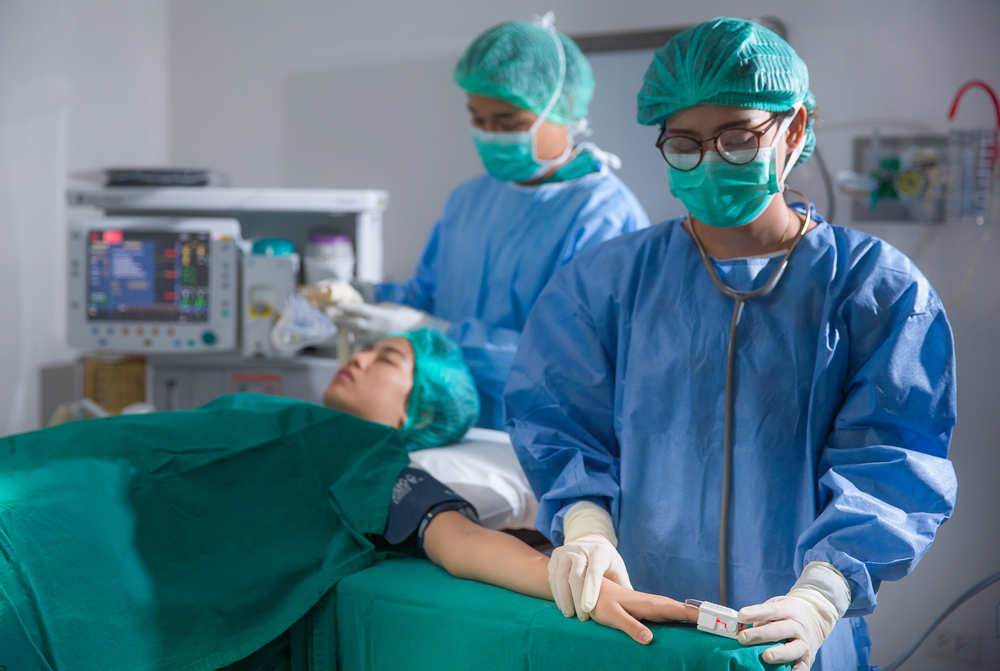Contents:
- Medical Video: Cataract Surgery (2009)
- Why do you have to do a test before surgery and after surgery?
- Some general tests performed before or after surgery
- 1. Complete peripheral blood examination
- 2. Check heart health with electocardiography (ECG / heart record)
- 3. X-ray scan
- 4. Urinalysis
- 5. Blood clotting test
- 6. MRI (Magnetic Resonance Imaging)
- 7. Endoscopy
Medical Video: Cataract Surgery (2009)
The operation must be carried out with thoroughness and thorough preparation, as well as after passing the operation, the results must be checked again. Doctors will not arbitrarily tell you to do surgery without various kinds of previous tests. Furthermore, after surgery the doctor will also monitor changes with the required tests according to their conditions. What are the tests before surgery or after? Check out the list below.
Why do you have to do a test before surgery and after surgery?
A pre-surgery test is done to determine whether you really need surgery or surgery or not. In addition, a preoperative test is also needed to ascertain how stable your body is, and see if your body is capable of operating or not in the near future.
After surgery, the doctor and nurse will also carry out a series of tests. What tests are carried out depend on your condition and the request of the surgeon who handles you. Postoperative testing is often done to ensure there are no complications that occur after surgery. In addition, a post-operative test is also conducted to determine the next action needed.
For example, after surgery a blood test is performed. This is necessary to determine whether after this surgery you need a blood transfusion or not, for example due to bleeding during surgery.
Some general tests performed before or after surgery
1. Complete peripheral blood examination
This blood test is done to check your overall health and detect a variety of disorders, such as anemia (decreased hemoglobin levels) and infection (increase leukocytes, aka white blood cells). This test can be done before or after surgery.
There are several components of blood that will be seen in this test reported on the MayoClinic page, namely:
- Red blood cells that help carry oxygen to all body tissues.
- White blood cells that fight infection.
- Hemoglobin, an oxygen-carrying protein that is in red blood cells.
- Hematocrit, which is the proportion of the number of red blood cells with other liquid components in the blood.
- Platelet or known as platelets which function to do blood clots.
2. Check heart health with electocardiography (ECG / heart record)
This test can show the electrical activity of the heart which is usually done before surgery. From this test it can be seen whether the heart rhythm is normal or not such as arrhythmias or dysrhythmias. In addition, the EKG also helps find muscle damage in the heart, helps find the causes of chest pain, palpitations, and heart murmurs.
3. X-ray scan
X-rays can help diagnose causes of shortness of breath, chest pain, coughing, and certain fevers. X-rays can also see the presence or absence of heart, respiratory, and lung abnormalities. From the results of X-ray X-ray can also be seen the condition of the bones and surrounding tissue without making invasive actions. X-rays can be used before or after surgery.
4. Urinalysis
Urinalysis or what is often called a urine test is a test performed to analyze urine that comes out of the body. With this test, it can be estimated the condition of the kidneys and bladder. Are there signs of infection in the kidney or bladder, or are there problems that require treatment in the kidney or bladder. This urine test can also find the presence or absence of illegal drugs consumed by the body before performing surgery.
This urine test itself will basically have 3 parts, namely
- Testing urine in a visual form, such as seeing the color and clarity of urine
- Test urine with a microscope to see things that cannot be detected by the eye. For example, there are erythrocytes in the urine (showing the presence of blood in the urine), bacteria in the urine (indicating an infection in the urinary tract), and crystals (indicating the presence of stones in the urinary tract).
- Dipstick test. Dipstick test is a test using thin plastic sticks that will be dipped in urine to check urine pH, protein content in urine, sugar, white blood cells, bilirubin, and also blood in the urine.
With this urine condition, it can be seen in advance what is happening in your body before the surgery actually begins.
5. Blood clotting test
The blood clotting tests that will be assessed are PT and APTT. This test is usually done before surgery to determine whether blood is easy or difficult to freeze. This will help during surgery.
If the blood easily freezes, then it is possible to lose blood during a small operation, whereas if the blood is difficult to freeze, the blood will continue to come out during surgery so you might lose a lot of blood.
6. MRI (Magnetic Resonance Imaging)
MRI is a non-invasive test (action without injuring the skin such as being injected or slashed). MRI is a test that uses powerful magnets, radio waves, and computers to provide detailed images in your body. Unlike X-rays and CT scans, MRI does not use radiation.
MRI helps doctors diagnose illness or injury, and monitor how well your body responds after treatment. This MRI can be done in various parts of your body. From seeing the brain and spinal cord, the condition of the heart and blood vessels, bones and joints, and other body organs.
Therefore, MRI can be needed both before the operating procedure and after the surgery is carried out to monitor the results again. Patients who do MRI must lie in bed during the examination.
7. Endoscopy
Endoscopy is a tool to see conditions in the body both before surgery and after surgery. This endoscope is used to examine parts of the digestive tract. Endoscopy is done by inserting a small, luminous tube and with a camera that enters the digestive tract.
Usually this endoscope will be inserted in the mouth and continue along the digestive tract to see conditions along the digestive tract. While the device enters the body, the camera on the tube will capture the image presented in the color TV monitor.
Keep in mind, before and after surgery the above checks are not all done routinely in every surgery. The check is selected based on what operation you will run. Especially MRI examinations and endoscopy, both of which will be carried out if it only supports surgical needs.












